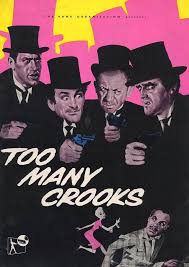
Fingers (George Cole) is the incompetent leader of a band of unsuccessful thieves, made up of grumpy and nearly competent Sid (Sidney James), illiterate wrestler Snowdrop (Bernard Bresslaw), the agreeable Whisper (Joe Melia), and the buxom and stunning Charmaine (Vera Day). After several failed jobs, Fingers comes up with a plan to kidnap the daughter of Billy Gordon (Terry-Thomas) a rich cad and tax cheat. It goes wrong, and instead of his daughter, they kidnap Gordon’s much-put-upon wife, Lucy (Brenda de Banzie).
A thoroughly enjoyable little picture that works due to a clever script, but mainly due to the entertaining and familiar (for Post-War British Comedy fans) cast. George Cole was one of the stalwarts of the movement. A protégé of Alastair Sim, he could slip between wild character parts (such as Flash Harry in The Belles of St. Trinian’s) and mildly goofy romantic leads (like in The Green Man). Here he’s in the middle, a somewhat sympathetic fool. Sid James was best known for the Carry On series, films that were a bit too music-hall and silly for my tastes, but James was always enjoyable and a major force in English comedy through the ‘50s and ‘60s. Here he’s a voice of reason, or at least understandable frustration. And there’s Terry-Thomas, who specialized in a range of upper class twits. Here he’s the strong-willed nasty type and he’s hilarious, leering and sneering. Bresslaw, Day, and de Banzie have no trouble keeping up their end, and they are joined by John Le Mesurier, who seems to be in every good British comedy for several decades and is always part of making them good. Even if they had nothing to work with, this group of actors would make for a pleasant ninety minutes.
But they did have more, with a script from dependable Michael Pertwee (brother to Jon Pertwee of Doctor Who fame), stylish directing from Mario Zampi, and a zippy jazz score from Stanley Black.
Too Many Crooks doesn’t bring anything new to the table. It shuffles things around a bit, but the situations and characters had been done before, and would be done again. It’s just done so nicely. It isn’t a standout movie, but a cozy one. It isn’t the one to start with if you haven’t watched Post-War British Comedies. But once you are a fan, this is comfort food.
Other Post-War British Comedies directed by Mario Zampi include Laughter in Paradise (1951) and The Naked Truth (1957),